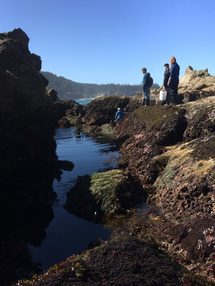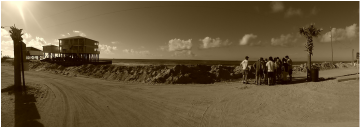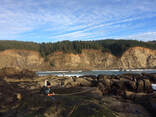Teaching Philosophy Summary

An educator, above all else, is a facilitator, encouraging student engagement and providing opportunities to learn by providing students with opportunities purposefully designed to help them develop the ability to think critically about course content and create a personal framework into which new content can be incorporated. My goal when I structure my courses is to assist students in developing their own appreciation for the amazing aspects of biology that dictate the everyday lives of humans and all living things. I encourage personally driven learning in a supportive environment through collaboration, experiential learning, and self-assessment.
Encouraging and guiding students through the process of developing the skills necessary to find the information they need is an essential element of the learning process. To develop a comfortable learning environment, I encourage students to actively take control over how they investigate and complete each project by working on assignments together and in an order that works the best for them, not necessarily in the order in which they may be listed. I found this to be a useful technique for students in lecture and laboratory classes as well as inquiry-based field experiences and mentorship situations. This type of collaborative activity allows students to learn from their fellow students who often have very different backgrounds, experience, and learning styles from which to draw. This type of environment is important to enhance learning potential for all students.

I design assignments that support individual student development of skills that are important not only for learning biology but also written and verbal communication. The contents of my courses have focused on basic biological principles and mechanisms that are observed in many different contexts. I develop course structures that emphasize basic mechanistic information to foster the students’ development of a knowledge framework into which new information, provided in lectures and collaborative group assignments, can be easily incorporated. For instance, after briefly discussing topics in lectures I periodically provide students with a list of primary literature papers that go deeper into subjects discussed in class. Student groups choose the topic or topics they were most interested in and collaboratively develop their own scientific conference style presentations over several weeks to share with the class. By the end of the course, students find their own primary literature sources and give an individual presentation on their subject. In this way, students progressively take more control over what and how topics they are interested in are presented and discussed in class.
For exams, I include multiple question styles designed to allow students to demonstrate critical thinking, understanding of course content, and their ability to transfer and apply the information they have learned. I design multiple choice and short answer exam questions that incorporate images, specimens, diagrams, etc. to give students with different learning processes the opportunity to best demonstrate their abilities.
A guiding theme for my courses is to emphasize the importance of students feeling comfortable making mistakes and persisting in their search for answers. My most basic driving goal is to encourage students to stop looking for the ‘right answer’ and learn to look at a situation, gather information, and make conclusions about what they observe based on demonstrated evidence. There is not always one right path to take to get to a destination or answer.
For more information, I have attached a copy of my full teaching philosophy for download.
For exams, I include multiple question styles designed to allow students to demonstrate critical thinking, understanding of course content, and their ability to transfer and apply the information they have learned. I design multiple choice and short answer exam questions that incorporate images, specimens, diagrams, etc. to give students with different learning processes the opportunity to best demonstrate their abilities.
A guiding theme for my courses is to emphasize the importance of students feeling comfortable making mistakes and persisting in their search for answers. My most basic driving goal is to encourage students to stop looking for the ‘right answer’ and learn to look at a situation, gather information, and make conclusions about what they observe based on demonstrated evidence. There is not always one right path to take to get to a destination or answer.
For more information, I have attached a copy of my full teaching philosophy for download.
| schram_teaching_philosophy_20191028.pdf | |
| File Size: | 57 kb |
| File Type: | |



